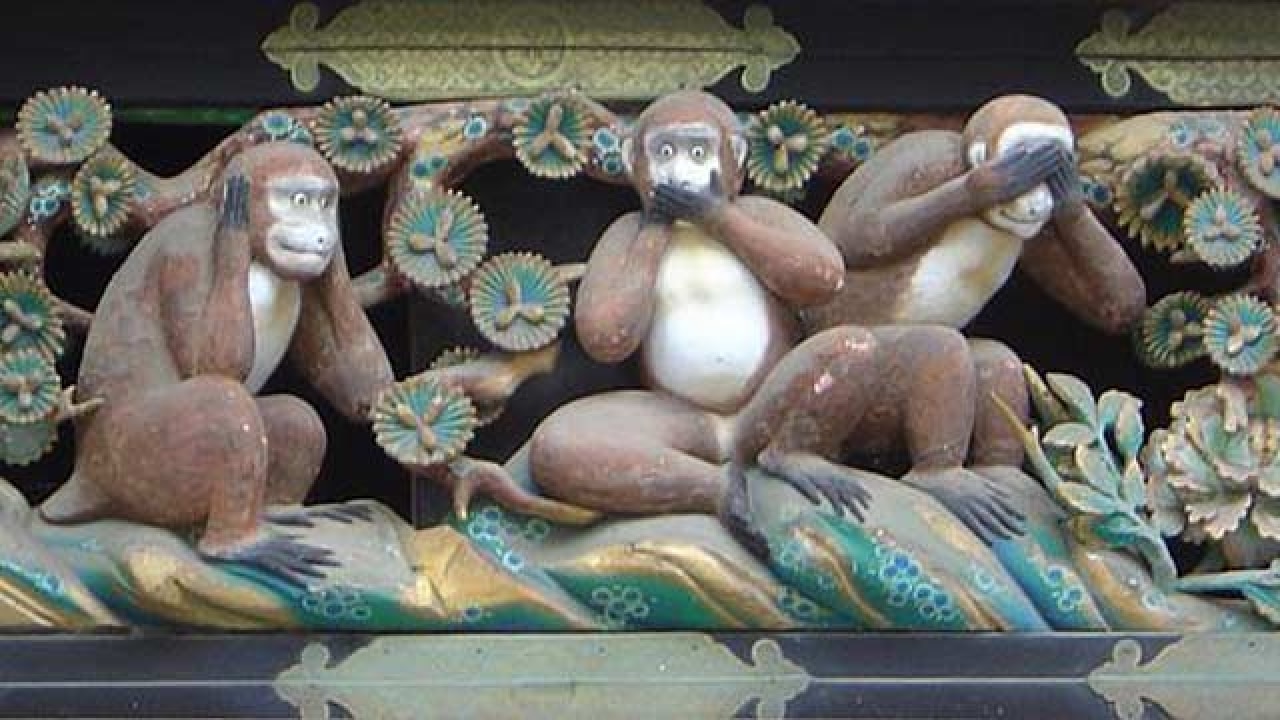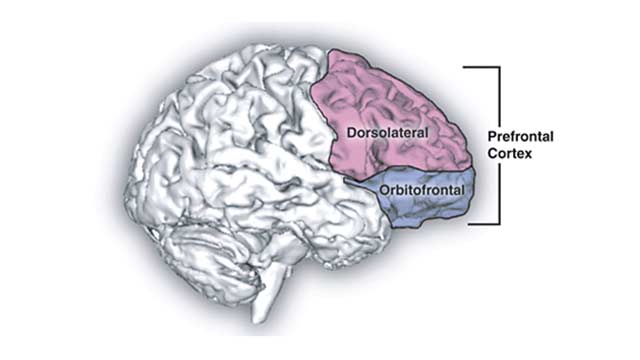
It is said that Mahatma Gandhi had very few possessions; spectacles, sandals, a pocket watch, a small bowl & plate, and interestingly, the fifth possession was a statue of the Three Wise Monkeys. The three monkeys have their origin in the writings of Confucius, Taoism, and Japanese Shintoism.
In Japanese Shintoism, the the three monkeys are -
• Mizaru who sees no evil;
• Kikazaru, who hears no evil; and
• Iwazaru, who speaks no evil.
These monkeys have come to resemble our actions or observation, listening, and speaking.
You might ask, and rightly so, how realistic is it to speak no evil, leave alone in these troubles times to refuse to see any evil? Let's explore how Gandhiji made it seem so effortless. I think he relied on two additional monkeys. One who could think no evil and the other who could feel no evil.
What we do (speak, listen, see) is a function of how we think and what we feel. So the job of these two monkeys was to make the task of Mizaru, Kikazaru, and Iwazaru; effortless, natural, and authentic. What we think, feel, and act become the core of what we consider our strengths.
Alex Linley and Susan Harrington defined them as an existing capacity for feeling, thinking and behaving in a way that allows optimal functioning (authentic and energising to the user) in the pursuit of valued performance and developmental outcomes.
The interplay of thoughts and emotions that form our character strengths
Our emotions matter. They work with our thought processes to form actions and in return we have outcomes. To change the outcome, we need to change the emotion and the thought process simultaneously.
The fact is even Gandhi would have felt pain, anguish, frustration when he saw his fellow citizens take up weapons. He must have felt a sense of despair at Dandi, Jallianwallah Bagh, and Chauri Chaura. He must have felt immense grief, watching his wife and best friend, breathe her last, in his own arms.
It is fascinating that the emotions of fear and despair he felt helped him discover his values. Gandhiji borrowed from the Bible (Luke 6:29) and the Quran (Chapter 41, Verse 34-35), when he propagated the philosophy of turning the other cheek.
Do watch this absolutely hilarious but poignant video on how he practices “turning the other cheek”.
You must show courage – be willing to take a blow – several blows – to show you will not strike back – nor will you be turned aside . . . And when – you do that it calls upon something in human nature – something that makes his hate for you diminish and his respect increase. I think Christ grasped that and I – I have seen it work. – from the script of Gandhi.
Before you arrive at a conclusion, that negative emotions are bad. Let me correct the misconception.
Negative emotions hold crucial mission critical information.
Feeling no evil is not about shunning negative emotions. Feeling no evil is about not formulating an evil emotional response.
- Anger denotes that something of value is being taken away or that an injustice has occurred. You want to seek reparation. If you are angry, it is about the appropriate expression of the anger, through meaningful conversations and change is what matters.
- Fear is a sign that something you value is at grave risk. It is a signal to seek adequate protection.
- Envy is a signal that you desire a skill or object that someone else possesses. If you are envious, sulking about the fairness might seem an appropriate response, but ultimately you might want to consider the pathways of exerting more energy and effort or even learning from the person.
- Frustration is an emotion that you have when you encounter obstacles placed in your path. If you face frustration, you might want to use your creativity to explore alternate pathways.
- Anxiety is an emotion that surfaces when you believe that the challenge you face is far higher than the resources and skills you possess. If you are faced with anxiety or stress, you might want to evaluate some resources that you could use, or even recall how you have resolved similar problems in the past.
- On the other end, boredom is an emotion when the challenge is far lower than your skill. It's time to raise your ambition.
How does this play out in real life?
Well try this. Think of a recent conflict when you momentarily lost control over yourself and lashed out. Maybe your boss has been acting like a jerk, and you felt insulted ignored. In a moment of stress, you momentarily lost control of yourself and “told him off”. It could have been a pesky sibling, who was invading your personal space, you thought that you should teach him a lesson, and you let go an emotional (cold shoulder), verbal, or indeed physical punch. It could have been an inefficient hotel receptionist, struggling to finish the check-out process at the hotel. You could feel your irritation levels rising. You wanted to tell her how in inefficient she was at her work, and did so.
What guided that moment of control or indeed the moment of insanity? The answer is in the two parts of the brain.
The Prefrontal Cortex - When you were in control

Most of the time, you respond positively. Why? The answer is in the prefrontal cortex, the part of the brain that houses the executive functions such as attention span, self-regulation & impulse control; problem solving, creativity, flexibility & abstract thinking; planning skills and working memory.
When left to function, your mind transformed the “evil monkeys” or evil stimulus with a positive and growth mindset. Most of the time, you were able to bring yourself to counsel your sibling, be patient with the receptionist, or use the feedback from the boss to make some changes.
The Amygdala hijack – When you totally lost it.
The amygdala is part of the limbic system of the brain. Being associated with anxiety, stress, anger, sadness, fear, binge-drinking, and aggression, it is the prime driver of the freeze, fight, or flight response. The amygdala has the power to metaphorically over-ride the sane messages that the prefrontal cortex would be sending out.
If you have had a long day, you might not be able to summon the will and effort to say the politically correct thing. You might even try to hide your true feelings. It does not work. Humans are great at recognising a fake and you will be found out.
Daniel Goleman calls this the “amygdala hijack”. A hijack is a state where an individual’s response is immediate, overwhelming, and disproportionate to “evil” stimulus. It is almost as if a different person has taken over. The hijack can take place within milliseconds to just a few seconds. Think about it, even when you hear a silly joke, you join into the laughter. That is your brain being hijacked. On the flip side, have you ever seen an airport brawl, where a passenger starts shouting at the airline staff over a delayed flight and everyone else jumps in? That is a negative hijack.
There might be an employee who always disrespects you by either coming late for meetings, not submitting reports on time, or just not keeping his sales task commitments. On that particularly tough day, the subordinate was inexplicably and without warning late on a deliverable or submitted shabby work. His tardy, sloppy, and casualness pissed you off.
Your mind processes the transgression as an attempt to undermine your power, status and authority. Your brain urges you to lash out, seek justice, revenge, and a restore the balance of power. Your brain is telling you, if you exempt this, you will be seen as a weak leader.
So this one time, you lashed out. Gosh it felt good. It certainly does. The amygdala had received the message that the balance of power has been restored.
Can entire cities and nations get hijacked?
Witness the celebrations in New York, on 2 May 2011, when news broke out that US Marines had eliminated their mortal enemy. That must have felt good. The balance of power was restored.
During sporting victories, entire countries rejoice. It is the same in times of war.
Gandhi’s - “balance of power” to the “power of balance”
As an individual, turning of the other cheek was an act of supreme courage. For thirteen hundred followers, to stand in line, and walk into harm’s way and not retaliate, was a sign of a mature India. He had perfected the art of remaining in fine balance.
In the video below, watch the emotions, on the faces of each of the actors. Pay particular attention to Vince Walker, whose character is based on the Webb Miller. It was Miller’s coverage of the Salt Satyagraha that helped turn the world opinion against the British rule.
"Whatever moral ascendance the West held was lost today. India is free for she has taken all that steel and cruelty can give, and she has neither cringed nor retreated." "In the words of his followers, 'Long live Mahatma Gandhi.' "– A report given by Vince Walker.
To conclude, starting from the violent mutiny of 1857, India traversed 73 years, to the Salt March in 1930. The quest for independence continued for another 17 years. Finally when we reached the summit, it was with our strengths, character and purpose intact.
The fact that we made peace with our colonial masters is a legacy worthy of consideration. Our exports to the UK is $ 9.3 billion and our imports is $ 5.0 billion. UK has 10,000 Indian restaurants; 18,000 Indian students study in the UK; ten members of the UK Parliament are of Indian descent, 2.3% of the British populace have Indian roots, and more than 800,000 tourists from the UK arrive in India.
Martin Luther King, Nelson Mandela, Aung San SuuKyi have followed similar paths, with great success. While we continue to be surrounded by danger, ask the question, is it time to turn the other cheek to our neighbours? We were successful with the most powerful empire in the world, can we repeat the act with our neighbours?
This man could…
The key to hearing no evil, seeing no evil, and speaking no evil; is in thinking no evil and feeling no evil. We need the five monkeys, more than ever.
The author is the Founder of The Positivity Company, where he helps business leaders become more positive and productive.